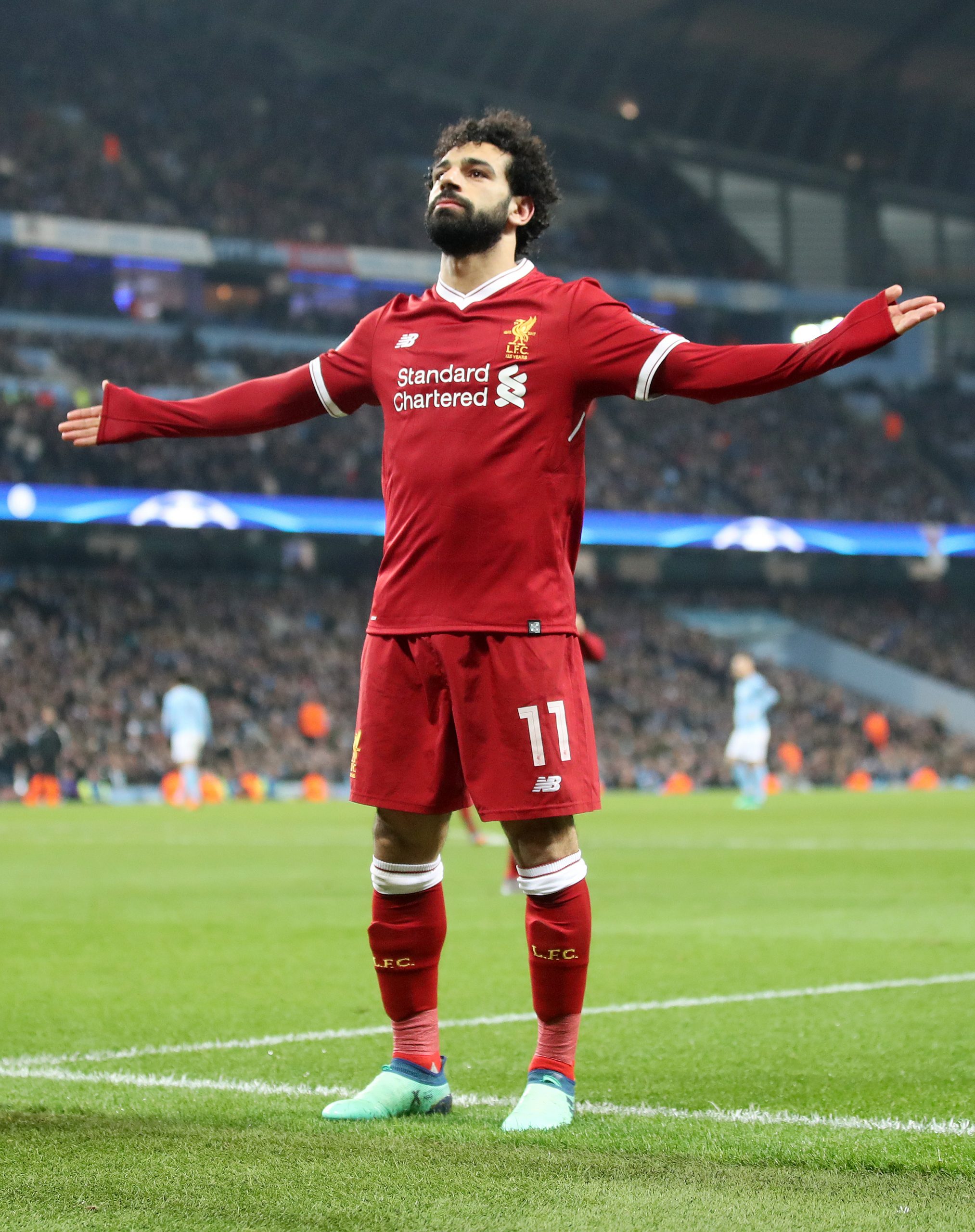Tag: OBV
Introducing On-Ball Value (OBV)
Obviously Mohamed Salah Should Have Been on the PFA Shortlist
It doesn’t take advanced statistics to understand how absurd Mohamed Salah not even being shortlisted for the Professional Football Association men’s Player of the Year award is. Six players make the list, and there’s a case to be made that Salah is more deserving than five of them.
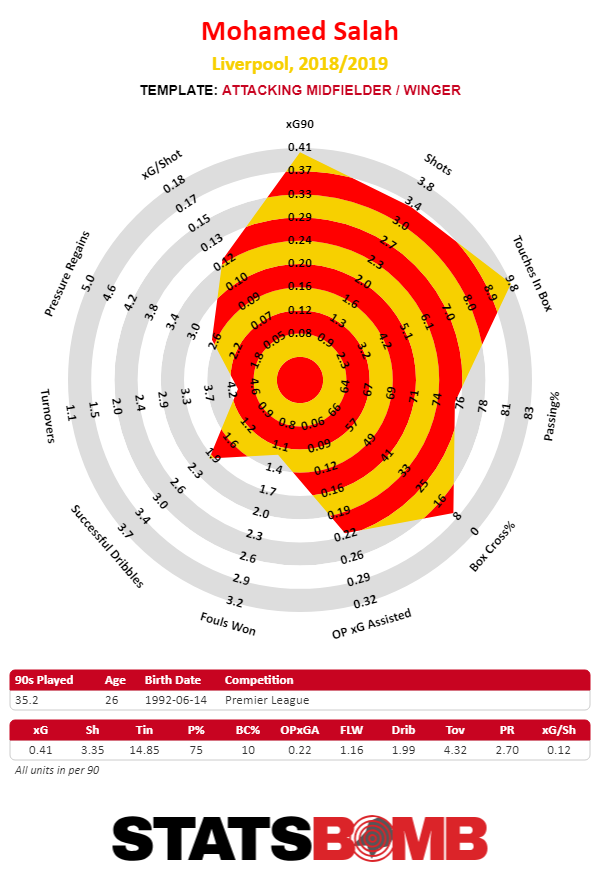
Let’s start by taking Salah’s teammate, defender Virgil van Dijk off the table. Van Dijk is an imposing granite statue given magical life and mystical defensive powers beyond our ken. Nobody particularly disputes that he’s the best defender in the Premier League, and since it’s impossible to compare defenders to attackers anyway, let’s assume he deserves to be there, quite possibly deserves to win the award, and that there’s no real reason to think otherwise.
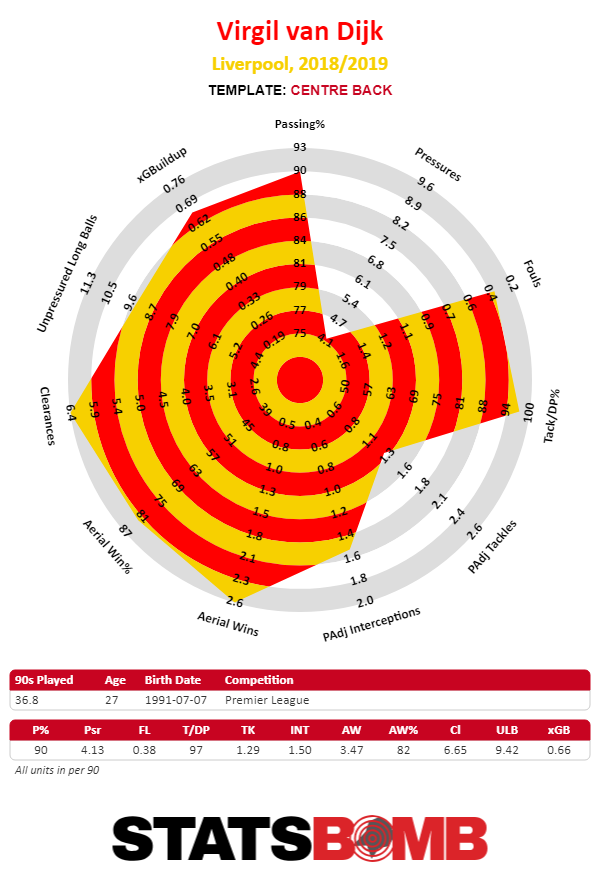
Everybody else on the other hand, well, let’s break it down. There were five phenomenal attackers nominated for the award. Sergio Aguero, Raheem Sterling, Bernardo Silva, Sadio Mane and Eden Hazard are all great. Its not clear that any of them are having a better year than Salah though.
Ageuro and Sterling are probably the two with the most impressive resumes. Aguero’s 19 goals are tied for the league lead with, you guessed it, Salah. And, to Aguero’s credit, he’s scored only two penalty goals while Salah has scored three, and he’s run up the goal total in less minutes, 2221 than Salah’s 3169. The assists tell a similar story, Aguero has eight and Salah has seven. Both impressive numbers to go alongside their goal scoring, Aguero’s more impressive, given the shorter minutes.
It’s worth noting here that Salah’s expected goals assisted per 90 tally is actually significantly higher than Aguero’s, 0.23 to 0.15. There are good reasons to not use xG when looking at end of the year awards. The metric is great at predicting what will happen, and how players that overperform will eventually come back to earth, but awards are backwards looking, not forwards looking. It seems both right and appropriate to award a player credit for having a great finishing season. But, assists are a slightly different matter. A player with a lot of assists, but with a relatively low xG assisted is, more or less, getting rewarded for his teammates’ finishing. At some point, the topline numbers are the topline numbers, but when it comes to passing it’s at least worth considering what’s going on under the hood.
Regardless, while you might make the case that Salah’s season is as good as Aguero’s it’s certainly not clearly better.
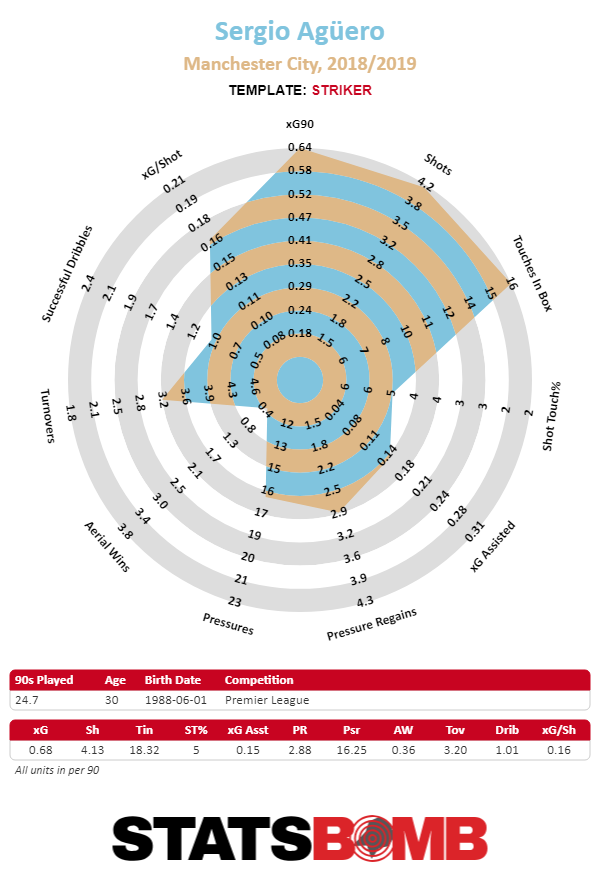
The same is true of Aguero’s teammate, Raheem Sterling. Sterling is having an amazing season. His goal scoring is based on some incredibly strong finishing, he’s averaging 0.60 non-penalty goals per 90 minutes, and “only” 0.40 xG per 90. Either he magically learned how to kick the ball last summer while he was in Russia, or finishing is itself a noisy skill that often times is divorced from talent level, and the arguments that he lacked the ability to finish before this season were greatly exaggerated.
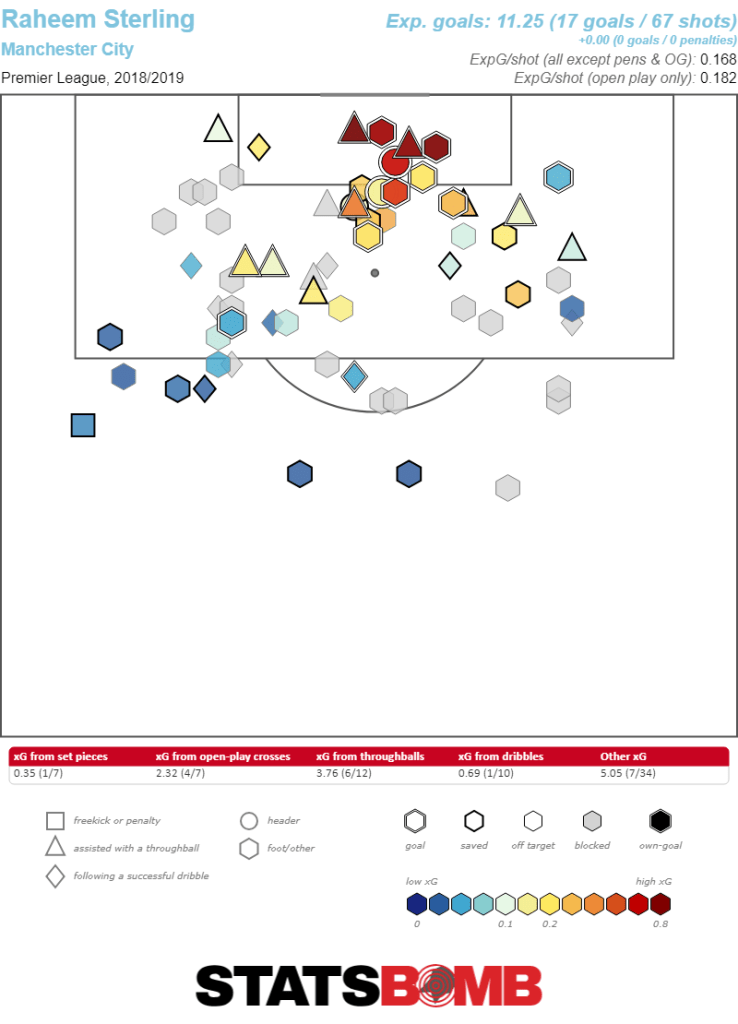
But, incredible as it seems to say about a man with 17 goals, it’s his passing that sets him apart from everybody else. His nine assists leave him tied for fifth in the Premier League, but he’s gotten those without the benefit of his teammates excelling at finishing his passes. He leads the league in xG assisted per 90 with an eye watering 0.35. There are only two other players in England that have played 1000 minutes and cleared 0.30 and they happen to be his teammates Leroy Sane and David Silva. If you want to make the case for the best attacking passer in this season’s Premier League, Sterling might be your guy. Combine that passing with a great finishing year, and again it’s hard to argue that Salah is having a better season than Sterling. Aguero and Sterling are the only two players with combined goals and assists per 90 that are higher than 0.90, hard to see how they should be here.
And this is where things start to get interesting. Eden Hazard’s major claim to this list is his creative ability. His 16 goals are a lot, but a fully quarter of them are penalties. His non-penalty goals per 90 rate of 0.37 is below Salah’s 0.45. Of course, Hazard makes up for that in the assist department where he has a league leading 13. But, while his assist total far outstrips the Egyptian’s he only assists 0.03 more xG per match. In effect the reason Hazard is on this list and Salah is not is that his teammates have done a better job finishing his passes than Salah’s have.
Of course, things are never that cut and dry. Hazard has been performing on a team which isn’t nearly as good as Salah. He is often asked to shoulder all the attacking creativity himself, while Salah gets to share it across the frontline. In fact, Hazard is the only player not from one of the top two teams on this list. Great team effects are a thing, and it’s easier to rack up the assists if you’ve got another top player or two to interact with. The argument for Hazard is that if the attackers swapped teams, Hazard’s numbers would go up and Salah’s would go down, demonstrating that in fact putting up lesser numbers on the poorer team is the greater achievement. It’s not a bad case, even if it is ultimately a theoretical argument that’s impossible to prove.
That argument isn’t available to Salah’s teammate, Sadio Mané. Mané has exactly one thing going for him. He’s scored 18 goals, none of them penalties. His non-penalty goal scoring rate of 0.55 is higher than Salah’s 0.45. Salah is better at literally everything else. Mané only has one assist, and his xG assisted rate of 0.15 is lower than Salah’s. And hey, scoring goals, non-penalty ones even, is important, but it’s not the only thing an attacker does (and if it was, well, Pierre-Emerick Aubameyang has scored more total goals and at exactly the same rate for non-penalty goals and he didn’t make the list). It’s just hard to find a real reason to include Mané over Salah that doesn’t amount to getting bored with last year’s winner and casting around for some new blood.
And that’s before we even get to Bernardo Silva. City’s younger Silva is a wonderful player. He has also scored a grand total of six goals and assisted on seven. His creative output isn’t higher than Salah’s, and it’s not a result of his teammates’ finishing either, his xG assisted per 90 is 0.21, higher than Mané’s but lower than every other attacker on this list. The case for Silva over Salah would primarily be a defensive one. Silva is truly a wonderful presser of the ball, and since he often plays as somewhat more of a midfielder than an attacker, it’s understandable that his attacking numbers are a little bit lower. And looking at their radars side by side it’s clear that Salah and Silva really do completely different things.
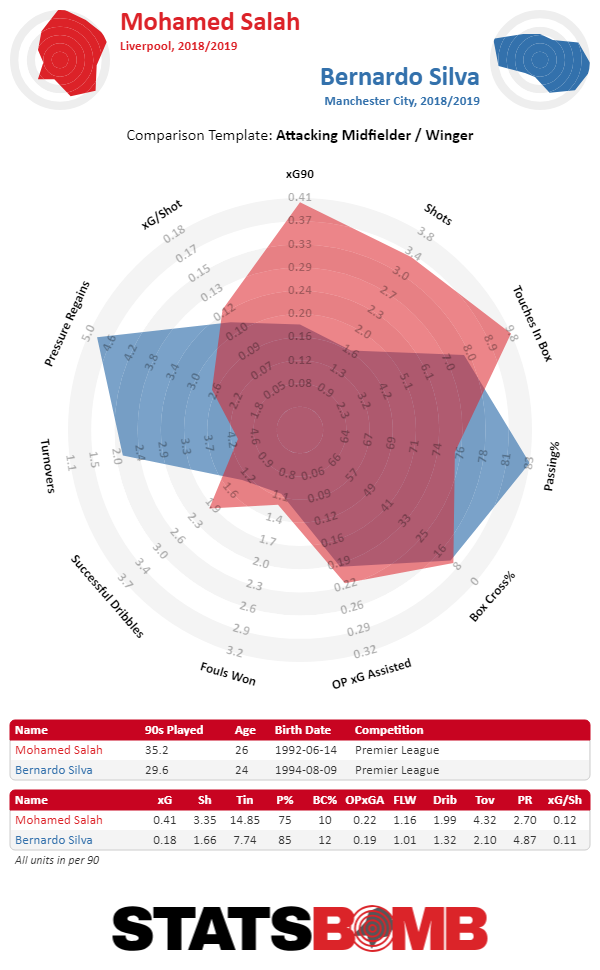
But, even so, it’s just hard to wrap your brain around Bernardo Silva being on this list because he’s a good pressing midfielder. He’s not even the most important midfielder on Manchester City when it comes to defensive contribution, that’s Fernandinho. In fact, Fernandinho would have a larger claim to this list than Silva, and it would be easier to make the case for him over Salah than it is for the all around game of Silva. Silva is a very good player, and he’s had an excellent season, but it pales in comparison to Salah.
Ultimately awards are silly. They exist only so we can argue about them and players can feel slighted by not receiving them and thus fuel their emotional and competitive fires. But, even understanding that, it takes some extreme mental gymnastics to make a list for player of the year that leaves off last year’s winner, especially given that he’s currently the joint top joint goal scorer in the Premier League. In the grand scheme of things it doesn’t really matter that the PFA made a bizarre decision to leave Salah off this list, but that doesn’t make it any more right.
Header image courtesy of the Press Association
